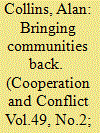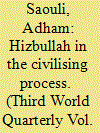| Srl | Item |
| 1 |
ID:
132332


|
|
|
|
|
| Publication |
2014.
|
| Summary/Abstract |
The Association of Southeast Asian Nations (ASEAN) is building a people-oriented community in Southeast Asia and it has all the hallmarks of a Deutschian security community, with its emphasis on people-to-people contact and the involvement of civil society organisations in the community's creation. In this article the argument is made that it is precisely the involvement of the masses that creates the peace inertia associated with security communities, and thus ASEAN's plural turn is an essential first step in making ASEAN's community a security community. Whether ASEAN can actually do this, and indeed whether the membership are united in this objective, is not the focus for this article. Instead, and contrary to the security community literature, which identifies ASEAN as a non-liberal security community and has emphasised the practice of self-restraint, this article argues that past ASEAN practice has prevented a security community forming in Southeast Asia, and using self-restraint as an explanation for why security communities create dependable expectations of peaceful change for members has resulted in the agency of 'community' being neglected. Hence, this article argues for the need to bring 'community' back.
|
|
|
|
|
|
|
|
|
|
|
|
|
|
|
|
| 2 |
ID:
106657


|
|
|
|
|
| Publication |
2011.
|
| Summary/Abstract |
This study builds on Norbert Elias's 'civilising process' theory to examine when, how and why Lebanon's Hizbullah exercises self-restraint or violence in its political interactions. As opposed to studies that focus on how Hizbullah's ideological goals determine its political behaviour, this study argues that Hizbullah's political conduct should be understood by locating the Islamic party at the crossroads of war-making with Israel and state-making in Lebanon. Hizbullah's aim to minimise its vulnerability to Israel led it to rationalise its behaviour in Lebanon by exercising self-restraint and by remoulding its ideology. However, as the political divide in Lebanon has sharpened and the state there weakened, Hizbullah has advanced to fill the void by employing state-like measures, including violence.
|
|
|
|
|
|
|
|
|
|
|
|
|
|
|
|
| 3 |
ID:
082701


|
|
|
|
|
| Publication |
2008.
|
| Summary/Abstract |
This article invokes a combination of analytical and normative arguments that highlight the leading role of practices in explaining the expansion of security communities. The analytical argument is that collective meanings, on which peaceful change is based, cognitively evolve - i.e. they are established in individuals' expectations and dispositions and they are institutionalized in practice - because of communities of practice. By that we mean like-minded groups of practitioners who are bound, both informally and contextually, by a shared interest in learning and applying a common practice. The normative argument is that security communities rest in part on the sharing of rational and moral expectations and dispositions of self-restraint. This thesis is illustrated by the example of the successful expansion of security-community identities from a core of North Atlantic Treaty Organization (NATO) states to Central and Eastern European countries during the 1990s, which was facilitated by a `cooperative-security' community of practice that, emerging from the Helsinki Process, endowed NATO with the practices necessary for the spread of self-restraint.
|
|
|
|
|
|
|
|
|
|
|
|
|
|
|
|